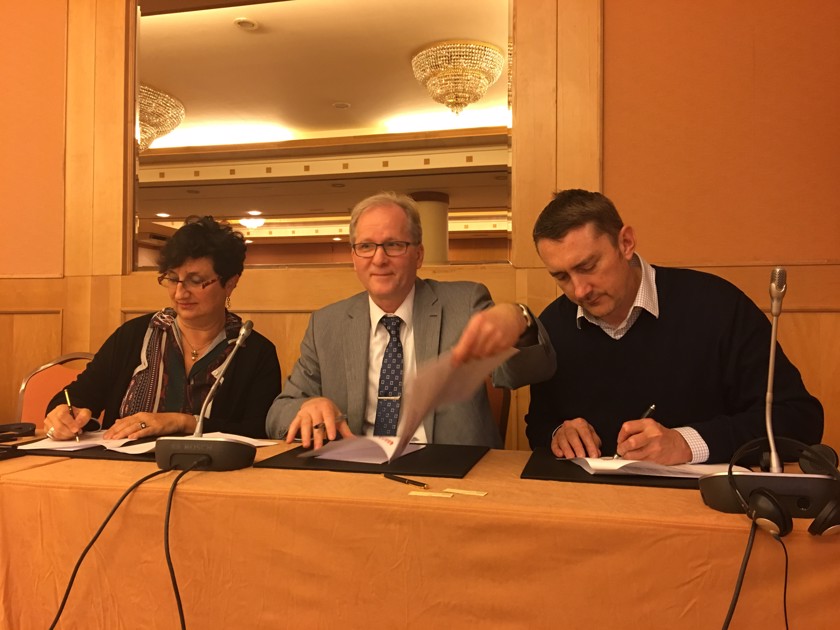“Making the transition to clean energy a just one for workers across Europe means for industriAll Europe to safeguard jobs and offer alternative professional perspectives to the workforce that will be affected by the transition in the power sector, but also in energy intensive industries Europe with its unique social model can be a role model of striking a balance between achieving a clean energy system and keeping sustainable high-quality jobs in Europe if there is a clear and strong engagement to invest in this project from all sides: EU, governments, industry and trade unions.”
Kristian Ruby, EURELECTRIC Secretary General, stated:
“This joint approach proves the dedication and mobilisation of the European Social Partners for the Electricity Sector to ensuring a successful and just clean energy transition in Europe. We strongly believe that decarbonisation of the electricity sector will be crucial to ensure the long term sustainability of the European economy providing for growth and quality employment, and we are ready to lead in this transition.”
Jan Willem Goudriaan, General Secretary of the European Federation of Public Service Unions, added:
“Providing workers affected by the energy transition with quality job alternatives and adequate skills are an absolute requirement to ensure a smooth transition. Ensuring well-funded social security systems, strong public services as well as public authorities’ commitment, social partners’ involvement and local communities’ participation are important aspects to make sure that no one is left behind. Fighting against energy poverty which affects nearly 11% of the European population today, as well as democratising energy production and distribution will also be crucial elements to make the energy transition just for the workers and fair for the European citizens.”
Luc Triangle, General Secretary of IndustriAll Europe, commented:
“Making the transition to clean energy a just one for workers across Europe means for industriAll Europe to safeguard jobs and offer alternative professional perspectives to the workforce that will be affected by the transition in the power sector, but also in energy intensive industries Europe with its unique social model can be a role model of striking a balance between achieving a clean energy system and keeping sustainable high-quality jobs in Europe if there is a clear and strong engagement to invest in this project from all sides: EU, governments, industry and trade unions.”
The European Social Partners in the electricity sector recognise the need for rapid and coherent action to decarbonise the economy to tackle climate change and its negative impacts on environment, society and economy. The Paris Agreement makes reference to a just transition, where governments commit to contribute to economic growth and the creation of sustainable high-quality employment in Europe.
In order to tap the full potential of green job creation, and to support companies regions and local communities relying on carbon intensive activities in their adaptation processes and low carbon investments, additional financial resources will have to be mobilised under the next Multiannual Financial Framework (MFF).
On 5 December, EURELECTRIC, together with IndustriAll Europe and EPSU, will organise the latest in its series of Power Talks debate on this important challenge for Europe, and the best way forward. To register to the event, click HERE.
Read joint statement on 'A Just Energy Transition'
Background:
EPSU and IndustriAll, representing the trade unions, and EURELECTRIC, representing the employers’ organisations, are the recognised social partners in the European Social Dialogue Committee for the Electricity Sector.
industriAll European Trade Union is the voice of industrial workers all over Europe. It represents 6.9 million workers across supply chains in manufacturing, mining and energy sectors on the European level
EPSU is the European Federation of Public Service Unions. It is the largest federation of the ETUC and comprises 8 million public service workers from over 250 trade unions across Europe. EPSU organises workers in the energy, water and waste sectors, health and social services and local, regional and central government, in all European countries including the EU’s Eastern Neighbourhood. It is the recognised regional organisation of Public Services International (PSI).
The Union of the Electricity Industry, EURELECTRIC, is the sector association representing the common interests of the electricity industry at pan-European level. EURELECTRIC represents 3500 companies across Europe with an aggregate turnover of €200 bln. It covers all major issues affecting the sector, from electricity generation and markets, to distribution networks, customers, as well as environment and sustainability issues.
